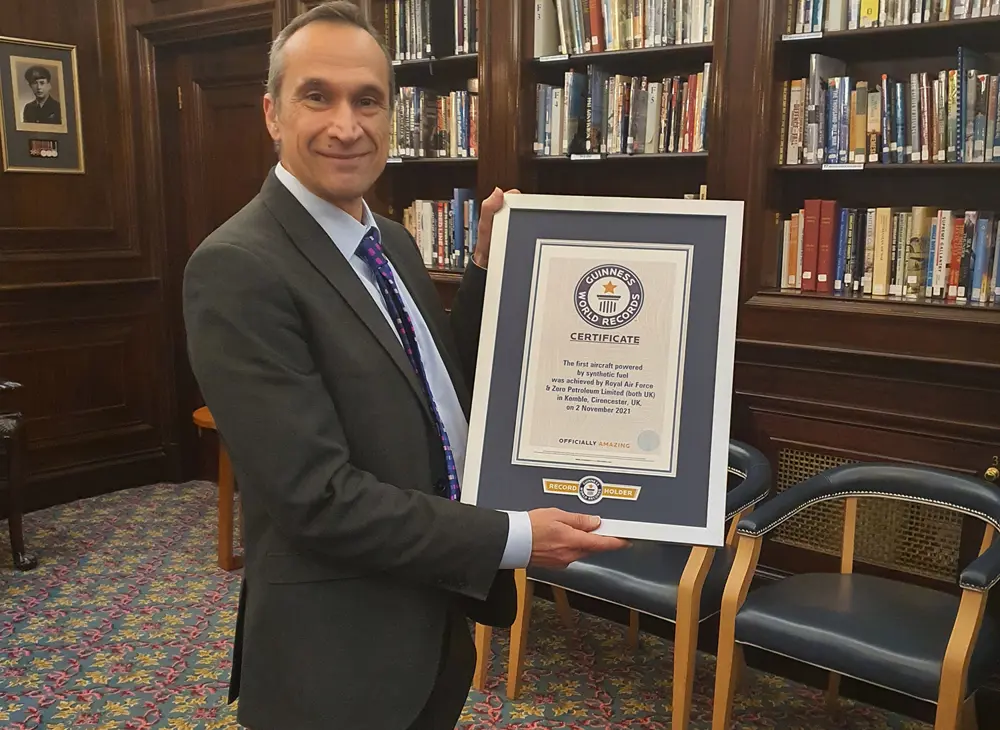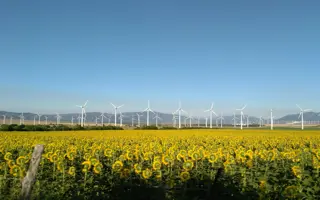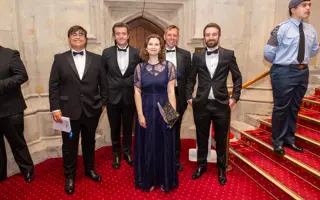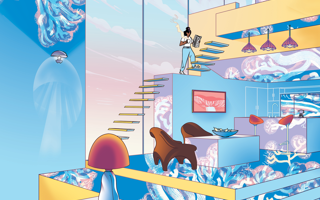
Processing the bigger picture
Nilay Shah always knew that he wanted to be an engineer. At school he liked chemistry but was more interested in its application than fundamental science. Chemical engineering seemed like a natural career option. When growing up in Kenya, “there was never any doubt that I was going to be an engineer,” he says. His mother called him “the professor,” he laughs. He planned to study chemical engineering in the UK then work in Nigeria, but he decided to stay on at Imperial College London after graduating.
He has now spent almost 40 years at Imperial, working in areas from paint-making to vaccine production, and has seen chemical engineering change in ways that his younger self’s ambitions could not have foreseen. One of the biggest changes in Shah’s time as an engineer has been the growing use of information technology.
Driven by falling hardware costs and growing software power, IT has shaped his career and, thanks in part to his own work, changed the nature of research in chemical engineering. These changes went alongside upheavals in the processing industries that fed off that research. Attention turned from oil refineries and petrochemical plants to bioprocessing, pharmaceuticals and other processing challenges. On the energy front, for example, with the goal of achieving net zero and sustainability more broadly, the focus has moved from processing hydrocarbons to becoming ‘carbon free’ and the prospect of a hydrogen economy and synthetic fuels.
Quick Q&A
What inspired you to become an engineer?
Being interested in how things work and taking them
apart and usually failing to put them back together
properly!
What’s your favourite project you’ve worked on?
The Future Vaccines Manufacturing Hub programme
– something that was conceived collaboratively as a
concept and turned into reality.
Who influenced your engineering career?
My PhD supervisors, Professor Roger Sargent FREng and
Professor Constantinos Pantelides FREng, both Fellows of
the Academy.
What’s the best part of your job now?
Developing the research missions for our new School of
Convergence Science in Sustainability.
Do you have a favourite tool or gadget?
Optimisation software.
Most impressive example of engineering to look at?
I really like the Falkirk Wheel.
What do you think is an overlooked engineering
success?
Large-scale, safe and economic production of chlorine for
drinking water.
A PhD in processing
Shah’s choice of PhD subject led him to study how processing plants plan and schedule their operations. This involved working on the fine chemicals and paint-making operations of ICI, then the UK’s dominant processing business. The company was interested in how to run production lines that can deliver a stream of different products. Paints, for example, come in many colours and variants. “Working out the sequence that makes the most sense is quite a complicated problem,” says Shah. His research started with a PhD thesis on ‘Efficient scheduling technologies for multipurpose plants’.
That PhD was in the Centre for Process Systems Engineering (CPSE), which opened in the late 1980s. This was an Interdisciplinary Research Centre (IRC), an initiative launched in the 1980s by the Engineering and Physical Sciences Research Council to work on topics that crossed disciplinary boundaries and with close involvement from industry. Shah proudly points out that the CPSE is one of just two of the original IRCs that is still in business, now as a joint venture with UCL. With a roster of about 40 academics and 200 researchers, Shah believes that CPSE, where he was director, is the UK’s biggest process systems engineering research group.

Shah was in the team that created Process Systems Enterprise Ltd (PSE), a spinout company to commercialise gPROMS with Professor Costas Pantelides FREng as its CEO. Shah was a part of the PSE team that won the MacRobert Award in 2007 for gPROMS. PSE grew to become a market leader in the process simulation market with more than 160 employees and a global revenue of more than £16 million in 2019. Siemens AG then acquired PSE for an estimated £100 million with gPROMS becoming the core of Siemens’s process system digital portfolio. The image to depict the gPROMS technology was part of a set of photographs of winners commissioned to celebrate the MacRobert Award’s 55th anniversary in 2024 © Ted Humble-Smith
Improved efficiency with software
At the time, the process industry was beginning to explore the role that computing could play in the design, manufacturing and operation of process plants. The IRC’s research made great strides in developing software that helped in this. These were early days in bringing IT to complex processing plants. “We were making a lot of progress on algorithms,” says Shah. “At the same time there were dramatic improvements in the hardware.”
The research revolved around modelling, simulation and optimisation of chemical and energy processes from the molecular level up to simulating complete chemical plants. That work culminated in the development of a range of tools, including gPROMS, a software platform for building computer models for monitoring and forecasting a processing plant’s performance throughout the process lifecycle. The technology has had an impact throughout the processing industry, including oil, pharmaceuticals, consumer products, and food. Its models are used for everything from real-time process plant design and optimisation to operator training.
From research to business
The spread of industries that the CPSE has covered over the decades reflects the changing shape of process systems engineering in the UK. Shah’s research had its roots in ICI’s Dulux paints factories – bought by AkzoNobel in 2008 – but the CPSE’s tools have much wider relevance. “Now we’re much more interested in sectors like pharmaceuticals, agrochemicals, and then the systems engineering aspects of energy.”
With this background and his interest in businesses, has Shah ever been tempted to leave academia and move into industry? “I’ve been asked a few times, but I still really enjoy teaching and research. I don’t really want to lose that.” Shah sees working with businesses as part of the job of an academic engineer. “I’ve always been interested in doing things with companies. Either collaborating with companies or setting up companies with colleagues to try to test these things.” Shah’s current business ventures include Zero Petroleum, a synthetic petroleum startup that he cofounded with Paddy Lowe FREng (‘Fuel for a net zero future’, Ingenia 89). “We can make a drop-in jet fuel and a drop-in gasoline,” Shah explains.

Shah holds the certificate for the Guinness World Record that Zero Petroleum received for the first flight with 100% synthetic fuel, in a collaboration with the Royal Air Force
Shah sees developing zero carbon aviation fuel as a “classical chemical engineering problem”. As he explains, “chemical engineers have been fine tuning fossil-based aviation fuel for decades. Now we realise we need new ones that are fossil free. The problem is jets are still running on those, and jets are not going to change their engines anytime soon.”
Always keen on seeing his research out in the real world, as part of developing the curriculum for students at Imperial, Shah took the opportunity of a spell as Director of Undergraduate Studies to develop a ‘business for engineers’ programme. This required students to write a business plan for their work. Alongside introducing an opportunity to ‘think business’ into the engineering teaching, Shah has campaigned for a wider acceptance of diversity and inclusion in academia. “I’ve always felt that engineers are important in society, and they should also reflect the society that they belong to. Secondly, it is unfair that certain people are not getting access to what I think is a very exciting and rewarding profession.”
“I’ve always felt that engineers are important in society, and they should also reflect the society that they belong to."
There is another reason why diversity matters. “You get better engineering if you have different perspectives. Most big engineering decisions actually have a lot of societal implications.” Diversity brings in that awareness of society. Shah has carried his conviction that diversity is essential for engineers and engineering into his work with the Royal Academy of Engineering, where he has been an active member of the Diversity and Inclusion Committee, advising on a variety of activities that have had a meaningful impact on diversity across the engineering profession. And as Chair of the Academy’s Membership Committee, played a key role in the establishment of Fellowship Fit for the Future initiative, which is driving more nominations of engineers from underrepresented groups, and oversaw its implementation.
The same concern about societal implications is important in another increasingly important aspect of Shah’s work, AI. AI was an esoteric academic pursuit when Shah started his engineering career. He looked into the idea of machine learning in the 1990s but was held back by the lack of computer power and the datasets there to feed the learning. “It didn’t really go anywhere.”
“We’re still getting to grips with exactly what AI will help us with in engineering,” Shah says. He has been looking into areas where special purpose AI methods can be useful, for example, in his work on using renewable energy to make hydrogen, and to analyse and simplify complex series of weather data. “That’s very different from what people think about when they talk about AI.”
Systems for a sustainable future
Talk of hydrogen and renewable energy leads into thinking about the future of energy and how to get to net zero. As Shah sees it, we are halfway there. “We’ve done the easy bit of the energy transition in many ways. This first bit, which has got us a long way, switching off coal-fired power plants, having a lot of wind power, trying to maintain our nuclear fleet. The next 50% is the hard 50%. We have got to electrify transport and decarbonise power completely.” He was involved in the Academy’s advice to government on the Clean Power 2030 Action Plan, as part of its working groups focusing on decarbonisation of the UK’s energy system and the role of hydrogen in a net zero energy system.

Shah has spent over 30 years as a professor of process systems engineering at Imperial College London
That policy input fits in with Shah’s belief in ‘systems thinking’. “A lot of my research has had a systems element in it. It’s something that I’ve enjoyed but sometimes found difficult to explain to people. Often people want a simple answer, and the answer is often not simple. Most of the things that we need to tackle now are not simple linear problems. They’re complex, lots of moving parts, nonlinear, dynamic. So that systems thinking is very important.” This is as important in policy issues as it is for engineering systems and processes.
Shah takes that thinking into the next phase of his career. After running the Department of Chemical Engineering at Imperial since 2016, he is about to become one of four directors – one each from engineering, science, business, and health – of a new School of Convergence Science in Sustainability at Imperial, one of four new Schools of Convergence Science. The plan is to look at ways of addressing the big problems that face society, such as climate change, decarbonisation and sustainability. In a different area, he adds, “Sustainable healthcare is something we want to do jointly with the health school.”
A new way of thinking
Developing vaccines quickly and safely
COVID-19 presented the engineers at Imperial College London with the same challenges that hit other universities. How do you teach and carry out research in a lockdown? In Shah’s case, as head of the university’s chemical engineering department, he was also drawn into the national challenge to find ways to solve the many problems that the virus posed. In particular, how could his experience in processing help?
Developing a new vaccine was just a part of the story. There also had to be ways to make it quickly, safely and reliably in huge quantities. Fortunately, Shah had already had the processing side of pharmaceuticals production in his repertoire. “I was interested in manufacturing applied to biotechnology. I realised that vaccines are interesting from this issue of scheduling and manufacturing optimisation.”
Shah had started to think about vaccine production when influenza vaccines caught his attention. “Every March health authorities in the northern hemisphere decide on the three or four most likely strains of flu virus that are going to be used for the next vaccination season.” Then, from April onwards, vaccines manufacturers make as much vaccine as possible before the vaccination season starts in September.
Shah’s team worked with one collaborator to look for ways to improve the production process. “We worked on a particular factory to reschedule their operations so that they could get many more batches out between April and September. The plant has to switch between different strains. They have to do one at a time and then switch back. So, it’s quite a complicated scheduling process.”
What started off as a project on the production of flu vaccines then moved on to a more ambitious goal of creating new platforms that are, as Shah describes them, “disease agnostic”. “The factory is not there just for making influenza vaccines, it could make a range of vaccines depending on what’s needed.”
Shah’s thinking first began around 2015 when an outbreak of the Ebola virus hit the headlines. The then Prime Minister, David Cameron, called on the Department for Health and Social Care to set up vaccine groups to look into the threats to the UK. Along with groups to consider particular viruses, there were also groups on vaccine development and vaccine manufacturing. “We started to explore the idea of rapid response platforms and rapid development processes. So trying to be more responsive.” That led to a funding call from the research councils for vaccine manufacturing hubs.
That work continues, says Shah, on developing vaccine platforms, “with an emphasis on support for low- and middle-income countries. We’ve collaborated with manufacturers in places like India, Vietnam, Bangladesh, and South Africa.” COVID-19 underlined the importance of these markets, when many countries were left at the back of the queue for supplies of vaccines. “A lot of countries are interested in developing their own capability. So we’re trying to do two things, make these quite advanced platforms, but equally develop them in a way that they are still appropriate to local capabilities.”
The new school will be a way to focus thinking and bring research disciplines together, capitalising on research from elsewhere. No classrooms and no degrees awarded, more “schools of future thought” as Imperial bills them.
The School of Sustainability inevitably takes Shah further into policy thinking. “I’ve become increasingly interested in being involved with advisory activities with government, getting involved with engineering, evidence and advice.” With a focus on climate and sustainability policy, Shah’s work with the Academy has also taken in biofuels and technologies for greenhouse gas removal. All of this policy thinking lays the foundations for the new phase of Shah’s work at Imperial.
Career timeline and distinctions
Master’s in chemical engineering, University of London, 1988. PhD in process systems engineering, University of London, 1992. Professor of process systems engineering, Imperial College London, 1992–present day. Co-Founder and Director, Process Systems Enterprise, 1997–2001. Director, Centre for Process Systems Engineering, Imperial College London, 2009–2016. Fellow, Royal Academy of Engineering, 2015. Deputy Director, Future Vaccine Manufacturing Hub, 2016–present day. Head of Department of Chemical Engineering, Imperial College London, 2016–2021. Awarded OBE for services to decarbonisation of UK economy, 2020. Co-Founder and Director, Zero Petroleum, 2020–present day. Trustee, Royal Academy of Engineering, 2021–2024. Director, Convergence School of Sustainability, 2024–present day.
Shah is now planning workshops on such topics as energy, ecosystems, clean air, and water. “I’d be surprised if we come up with something that nobody had ever thought of,” he adds. “I think we know what a lot of the big societal challenges are. We’re working initially with our internal community to create a shortlist of priority themes, and then we’ll road-test those with external partners, like NGOs, foundations, government, industry, and other universities.” Then the idea is to establish a set of ‘missions’ and to become what Imperial dubs “a catalytic force” that can “bring to life an exciting new paradigm for scientific exploration”.
This puts Shah at the heart of a ‘research system’ that already has hundreds of researchers working on aspects of climate, energy and sustainability. The new school will bring in even wider expertise. In his new role Shah will be able to combine his engineering thinking with his policy work to make the most of Imperial’s diversity in research in pursuit of systems thinking on a grand scale.
Find out more about the President's Medal
Contributors
Michael Kenward OBE
Author
Get a free monthly dose of engineering innovation in your inbox
SubscribeRelated content
Chemical

Q&A: Olivia Sweeney
Olivia Sweeney sources aroma chemicals to create fragrances at cosmetics company Lush. She is working on finding new, more sustainable sources of fragrance ingredients, with an interest in the research and development of chemical production from waste streams.

Biofuels’ journey to the mainstream
Liquid biofuels today make up about 8% of road and non-road fuel supplies in the UK. The government plans to reach nearly 10% by 2020 in order to reduce CO₂ emissions. It has also laid out targets to incentivise innovation and the production of ‘development fuels’.

Compostable plastics
Compostable plastics can be turned – alongside food and other organic waste – into compost. But how environmentally friendly are they really?

Q&A: Michelle Watiki
From placements at Xerox and Rolls Royce, to becoming a board member for the Association for Black and Ethnic Minority Engineers, chemical engineering graduate Michelle Watiki hopes to apply her knowledge to sustainability and net zero, as well as helping future engineering students.
Other content from Ingenia
Quick read

- Environment & sustainability
- Opinion
A young engineer’s perspective on the good, the bad and the ugly of COP27

- Environment & sustainability
- Issue 95
How do we pay for net zero technologies?
Quick read

- Transport
- Mechanical
- How I got here
Electrifying trains and STEMAZING outreach

- Civil & structural
- Environment & sustainability
- Issue 95